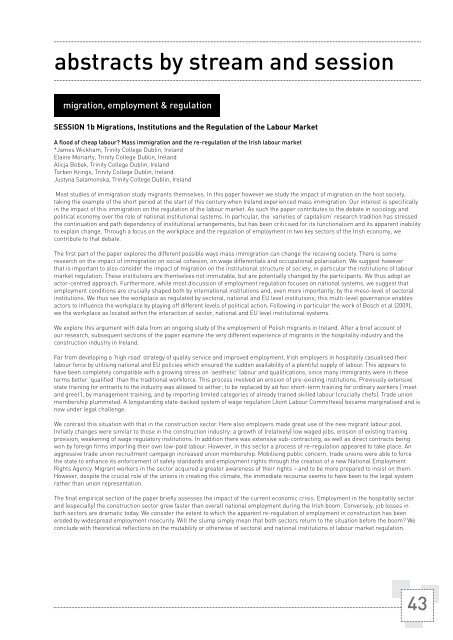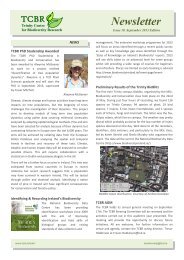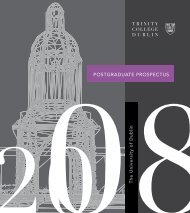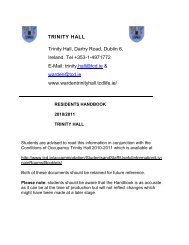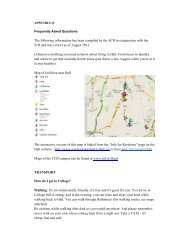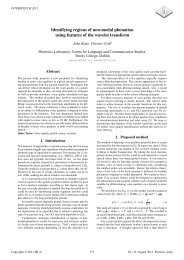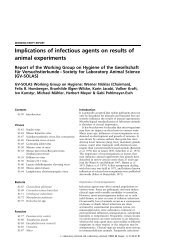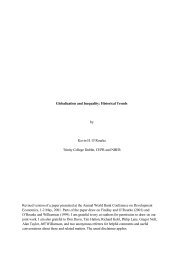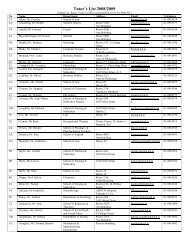Conference Programme (PDF, 1019KB) - Trinity College Dublin
Conference Programme (PDF, 1019KB) - Trinity College Dublin
Conference Programme (PDF, 1019KB) - Trinity College Dublin
Create successful ePaper yourself
Turn your PDF publications into a flip-book with our unique Google optimized e-Paper software.
abstracts by stream and session<br />
migration, employment & regulation<br />
SESSION 1b Migrations, Institutions and the Regulation of the Labour Market<br />
A flood of cheap labour? Mass immigration and the re-regulation of the Irish labour market<br />
*James Wickham, <strong>Trinity</strong> <strong>College</strong> <strong>Dublin</strong>, Ireland<br />
Elaine Moriarty, <strong>Trinity</strong> <strong>College</strong> <strong>Dublin</strong>, Ireland<br />
Alicja Bobek, <strong>Trinity</strong> <strong>College</strong> <strong>Dublin</strong>, Ireland<br />
Torben Krings, <strong>Trinity</strong> <strong>College</strong> <strong>Dublin</strong>, Ireland<br />
Justyna Salamonska, <strong>Trinity</strong> <strong>College</strong> <strong>Dublin</strong>, Ireland<br />
Most studies of immigration study migrants themselves. In this paper however we study the impact of migration on the host society,<br />
taking the example of the short period at the start of this century when Ireland experienced mass immigration. Our interest is specifically<br />
in the impact of this immigration on the regulation of the labour market. As such the paper contributes to the debate in sociology and<br />
political economy over the role of national institutional systems. In particular, the ‘varieties of capitalism’ research tradition has stressed<br />
the continuation and path dependency of institutional arrangements, but has been criticised for its functionalism and its apparent inability<br />
to explain change. Through a focus on the workplace and the regulation of employment in two key sectors of the Irish economy, we<br />
contribute to that debate.<br />
The first part of the paper explores the different possible ways mass immigration can change the receiving society. There is some<br />
research on the impact of immigration on social cohesion, on wage differentials and occupational polarisation. We suggest however<br />
that is important to also consider the impact of migration on the institutional structure of society, in particular the institutions of labour<br />
market regulation. These institutions are themselves not immutable, but are potentially changed by the participants. We thus adopt an<br />
actor-centred approach. Furthermore, while most discussion of employment regulation focuses on national systems, we suggest that<br />
employment conditions are crucially shaped both by international institutions and, even more importantly, by the meso-level of sectoral<br />
institutions. We thus see the workplace as regulated by sectoral, national and EU level institutions; this multi-level governance enables<br />
actors to influence the workplace by playing off different levels of political action. Following in particular the work of Bosch et al (2009),<br />
we the workplace as located within the interaction of sector, national and EU level institutional systems.<br />
We explore this argument with data from an ongoing study of the employment of Polish migrants in Ireland. After a brief account of<br />
our research, subsequent sections of the paper examine the very different experience of migrants in the hospitality industry and the<br />
construction industry in Ireland.<br />
Far from developing a ‘high road’ strategy of quality service and improved employment, Irish employers in hospitality casualised their<br />
labour force by utilising national and EU policies which ensured the sudden availability of a plentiful supply of labour. This appears to<br />
have been completely compatible with a growing stress on ‘aesthetic’ labour and qualifications, since many immigrants were in these<br />
terms better ‘qualified’ than the traditional workforce. This process involved an erosion of pre-existing institutions. Previously extensive<br />
state training for entrants to the industry was allowed to wither, to be replaced by ad hoc short-term training for ordinary workers (‘meet<br />
and greet’), by management training, and by importing limited categories of already trained skilled labour (crucially chefs). Trade union<br />
membership plummeted. A longstanding state-backed system of wage regulation (Joint Labour Committees) became marginalised and is<br />
now under legal challenge.<br />
We contrast this situation with that in the construction sector. Here also employers made great use of the new migrant labour pool.<br />
Initially changes were similar to those in the construction industry: a growth of (relatively) low waged jobs, erosion of existing training<br />
provision, weakening of wage regulatory institutions. In addition there was extensive sub-contracting, as well as direct contracts being<br />
won by foreign firms importing their own low-paid labour. However, in this sector a process of re-regulation appeared to take place. An<br />
aggressive trade union recruitment campaign increased union membership. Mobilising public concern, trade unions were able to force<br />
the state to enhance its enforcement of safety standards and employment rights through the creation of a new National Employment<br />
Rights Agency. Migrant workers in the sector acquired a greater awareness of their rights – and to be more prepared to insist on them.<br />
However, despite the crucial role of the unions in creating this climate, the immediate recourse seems to have been to the legal system<br />
rather than union representation.<br />
The final empirical section of the paper briefly assesses the impact of the current economic crisis. Employment in the hospitality sector<br />
and (especially) the construction sector grew faster than overall national employment during the Irish boom. Conversely, job losses in<br />
both sectors are dramatic today. We consider the extent to which the apparent re-regulation of employment in construction has been<br />
eroded by widespread employment insecurity. Will the slump simply mean that both sectors return to the situation before the boom? We<br />
conclude with theoretical reflections on the mutability or otherwise of sectoral and national institutions of labour market regulation.<br />
43


